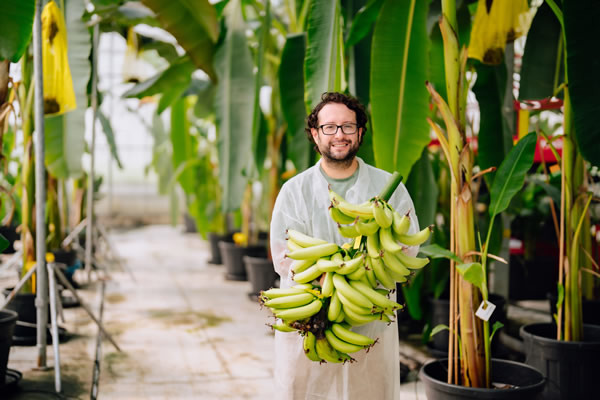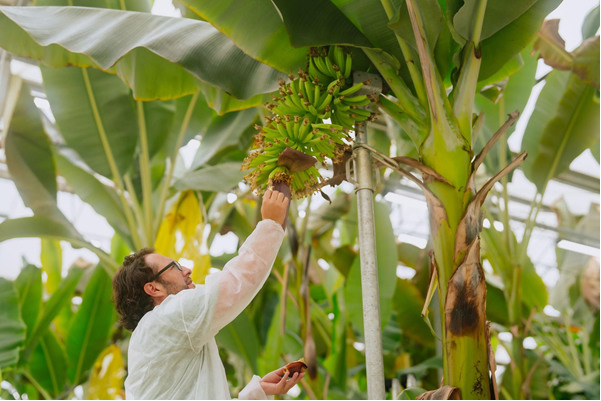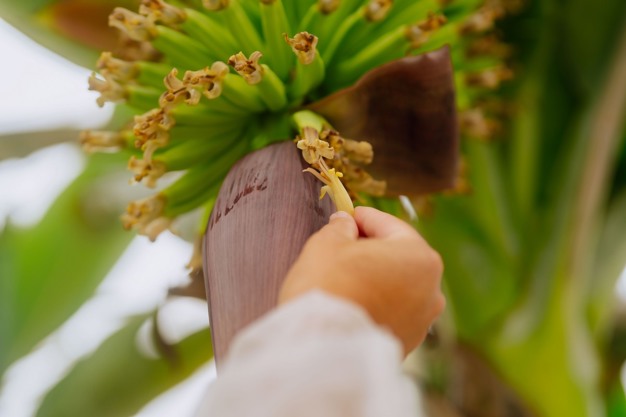Yelloway, an initiative of Chiquita, KeyGene, MusaRadix and Wageningen University & Research (WUR), introduces Yelloway One, a novel triploid banana hybrid that is resistant to the fungal disease Tropical Race 4 (TR4) and partially resistant to Black Sigatoka. These diseases pose a major threat to the survival of the banana as we know it today.

Yelloway's goal is to develop banana varieties that are resistant to the diseases that threaten the banana with extinction and still have the same look, feel and shelf life as the well-known Cavendish banana.
Yelloway One is the first prototype of the banana varieties that will be developed in the Yelloway breeding program. As the first of a new generation of non-genetically modified, crossbred banana varieties, Yelloway One will help take export banana production into a new era.

Yelloway One
Yelloway One is the first edible banana to present combined resistance to Fusarium Wilt of Banana (FWB), caused by Tropical Race 4 (TR4), and Black Leaf Streak Disease (BLSD) known as Black Sigatoka. TR4 and BLSD pose the biggest threat to the banana industry and cost more than hundreds of millions of dollars annually to control. Yelloway's breeding strategy has successfully achieved resistance to these diseases.
This marks a crucial milestone for Yelloway. It demonstrates that banana varieties resistant to TR4 and Black Sigatoka can be developed through crossbreeding—something the industry has long anticipated. With these new varieties, Yelloway aims to support the global banana industry in tackling these diseases while contributing to more sustainable cultivation practices. Yelloway One is now on the verge of flowering and bearing fruit for the first time in the greenhouse. Yelloway has multiplied the plants and will soon send them to TR4 and Black Sigatoka-affected areas in the Philippines and Indonesia for field trials.
Yelloway: a unique collaboration
Yelloway developed a unique breeding platform to continuously innovate in development of banana varieties. It combines natural crossbreeding with the latest DNA sequencing and analysis technologies to accelerate the breeding process. With access to a comprehensive collection of banana species and in-depth knowledge of the origins of modern varieties, Yelloway is now creating new test hybrids. These hybrids are selected based on specific desired traits, which are quickly and accurately identified using genetic markers from the Yelloway program.

A team of scientists led by Dr. Fernando García-Bastidas from KeyGene in the Netherlands developed Yelloway One. Three principles make Yelloway's approach unique. First, genetic diversity, with over 150 banana varieties in Yelloway's own collection, provides a crucial foundation for the available banana diversity.
Professor Gert Kema from Wageningen University & Research, a key partner of Yelloway, emphasizes that developing new varieties and biodiversity are essential for a sustainable banana sector. He believes that disease resistance will make banana production more sustainable and that new resistant varieties offer opportunities for millions of small farmers in Africa, Asia, and Latin America.
For more information:
Chiquita
www.chiquita.be
